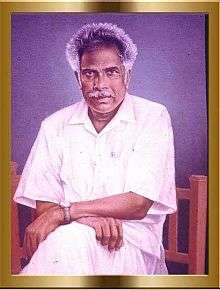Cherukad
Cherukad Govinda Pisharodi (26 August 1914 – 28 October 1976), commonly known as Cherukad, was a Malayalam-language playwright, novelist, poet and political activist, associated with the Communist movement in Kerala state, India.[1]
Cherukad | |
|---|---|
 | |
| Born | Cherukat Govinda Pisharodi 26 August 1914 Chemmalasseri, Perinthalmanna, Madras State, British India |
| Died | 28 October 1976 (aged 62) |
| Occupation | Writer, political activist, teacher |
| Language | Malayalam |
| Nationality | Indian |
| Genre | Play, novel, short story, poetry, essay, Autobiography |
| Literary movement | Progressive literature |
| Notable works | Jeevithappatha, Muthassi, Manninte Maaril |
| Notable awards | Sahitya Akademi Award, Kerala Sahitya Akademi Award |
Biography
Cherukad was born in Chemmalasseri in Perinthalmanna taluk to Kizheettil Pisharath Karunakara Pisharody and Cherukad Pisharath Narayani Pisharasiar.[1] He got elementary training in Sanskrit from Guru Gopalanezhuthachan. After completing high school education, he joined as a teacher in Chemmala Aided Mappila School.[1] He passed Vidvan Examination from Madras and worked in many schools as teacher before joining Pattambi Sanskrit College as Lecturer.[1]
In 1936, Cherukad married Kizheettil Pisharath Lakshmi Pisharasiar.[1] Their son K. P. Mohanan is a noted writer.[1]
Cherukad's politically charged writing was influential in defining the Malayalam literature of the fifties and sixties.[2] His political life was connected with the lives of the leading politicians and patriots of Kerala. Cherukad was one of the founding members of the Deshabhimani Study Circle, a progressive literary movement in Kerala and the predecessor of the Purogamana Kala Sahitya Sangham.[1] Some of his important works are Jeevithappatha, Tharavaditham, Manushyabandhangal, Namal Onnu, Manushya Hridayangal, Janmabhumi, Devalokam, Manninte Maril (On the Bosom of the Soil), Muthassi and Sanidasa.[1] His autobiography Jeevithappatha (1974) received the Kerala Sahitya Akademi Award in 1975 and Kendra Sahitya Akademi Award in 1977.[3]
Cherukad died on 28 October 1976.[1] The Cherukad Award is an annual literary award given in his memory.[4]
Works
Novel
- Muthassi
- Manninte Maaril
- Bhooprabhu
- Maranapathram
- Sanidasa
- Devalokam
Play
- Snehabandhangal
- Manushyahridayangal
- Kutti Thampuran
- Vaalnakshatram
- Visuddha Nuna
- Chittu Vilakku
- Tharavaditham
- Nammalonnu
- Swathanthra
- Mulankoottam
- Adima
- Janmabhumi
- Anakkettu
- Rakteswari
- Kodumkaattu
- Kutti Thampuratti
- Doctor Kachan
- Odukkathe Onam
Short story
- Chekkuthante Koodu
- Theruvinte Kutti
- Mudra Motiram
- Chuttan Moori
- Oru Divasam
- Cherukadinte Kathakal
Poetry
- Manushyane Maanikkuka
- Anthappuram
- Methaapp
- Aradhana
- Thiramala
Autobiography
- Jeevithappatha
References
- "ചെറുകാട് ഗോവിന്ദപ്പിഷാരഡി" [Cherukad Govinda Pisharodi] (in Malayalam). Kerala Sahitya Akademi. Missing or empty
|url=(help) - "Remembering Mundassery, Cherukad". The Hindu. Kozhikode, India. 26 October 2012. Retrieved 11 June 2013.
- Amaresh Datta (1988). Encyclopaedia of Indian Literature. Volume 2. p. 1846.
- "Cherukad Award presented". The Hindu. 30 October 2005. Retrieved 11 June 2013.
External links
- Article by C Radhakrishnan
- Public Relations Department, Government of Kerala. Retrieved 11 April 2011.
- Deshabhimani Weekly special issue on the birth centenary of Cherukad